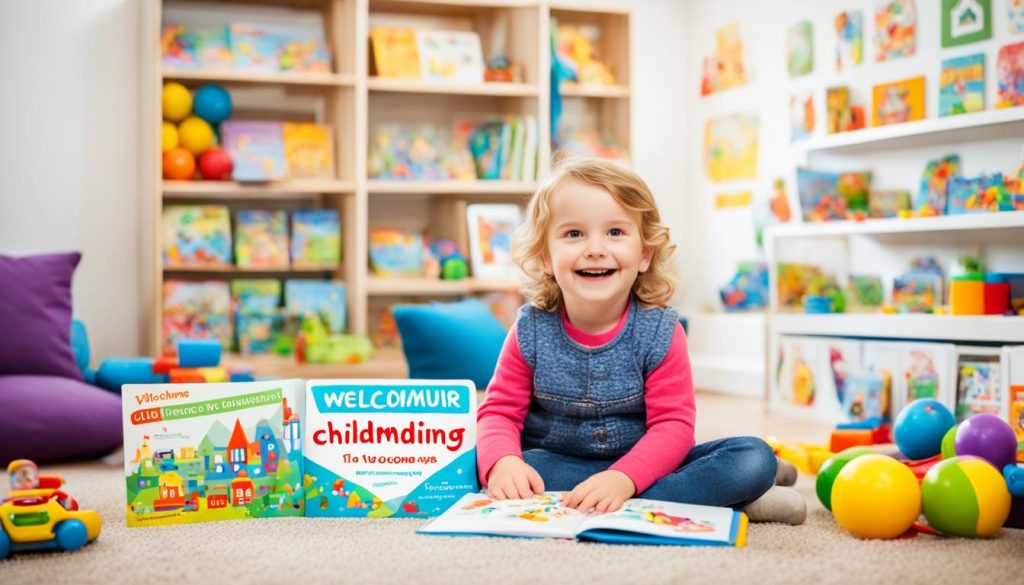Are you passionate about children’s care and early years education? Have you ever considered starting your own childminding business? Running a childminding service can be a fulfilling and rewarding venture, allowing you to provide essential care and support for young children while also offering a flexible work-life balance.
In this article, we will guide you through the necessary steps to start a childminding business in the United Kingdom. From meeting the registration requirements to understanding the costs involved, we’ll provide you with all the essential information to kickstart your entrepreneurial journey as a childminder.
Let’s dive in and explore how you can transform your passion for children’s care into a successful childminding business.
Introduction to Childminding Business
Starting a childminding business presents a rewarding opportunity for individuals passionate about caring for children and fostering their development in a nurturing environment. As a childminder, you provide essential childcare services to families, offering a safe and stimulating space where children can learn, play, and grow.
This business allows you to work from home or your own dedicated space, giving you the flexibility to manage your schedule while making a positive impact on young lives. However, entering this field requires careful planning, including understanding regulatory requirements, securing necessary training and certifications, and establishing a strong foundation for your business operations.
With the right preparation and dedication, you can create a successful childminding service that meets the needs of both children and their families in your community.

Requirements for Starting a Childminding Business
When starting a childminding business, it’s essential to ensure you have the right equipment while prioritizing safety. You may already own many necessary items, but additional purchases might be required based on the number and ages of the children in your care.
- Food Preparation Equipment: Use your existing kitchen tools, including a refrigerator, oven, and cooking utensils. Consider child-friendly tableware and baby bottle sterilizing equipment.
- Furniture: Utilize home furniture, but invest in child-sized tables, chairs, and comfortable seating like beanbags. Cots or sleep mats are necessary for nap time.
- Baby Equipment: If you care for infants, acquire bouncer chairs, changing mats, and spare diapers. Sensory toys and safe exploration materials are also vital.
- Indoor and Outdoor Equipment: Provide art supplies, imaginative play toys, and soft toys for indoor activities. For outdoor play, consider slides, bicycles, and various games to keep children engaged.
By carefully assessing your needs and investing in quality equipment, you can create a safe and stimulating environment that promotes learning and fun for the children in your care.

How to Start a Childminding Business?
Starting a childminding business involves several important steps to ensure that you meet the necessary requirements and provide high-quality care for children. Follow these steps to establish your childminding business successfully:
1. Pass Criminal and Health Checks
The safety and well-being of the children in your care is paramount. Therefore, the first step is to undergo thorough Criminal and Health Checks.
- Criminal Checks: This is typically conducted through a DBS (Disclosure and Barring Service) check, designed to prevent unsuitable individuals from working with children.
- Health Checks: You will need to complete a Health Declaration form to confirm your fitness to work with children, ensuring you can handle the physical and emotional demands of the role.
2. Complete Essential Training
To offer quality care as a qualified childminder, it is crucial to undertake relevant training. Key courses include:
- Childminder Training: This comprehensive training covers important topics such as child development, safeguarding practices, and creating engaging learning environments.
- Paediatric First Aid: Completing a 12-hour Paediatric First Aid course is essential. This training equips you with the skills to manage emergencies and ensure the safety of the children you look after.
3. Apply to the Correct Ofsted Register
After completing the necessary checks and required training, the next step is to apply to the appropriate Ofsted register:
- Early Years Register: If you plan to care for children from birth to 5 years old, you must register here.
- Childcare Register: If your services will include children aged 5 to 8 years old, this is the appropriate register for you.
4. Prepare for Your Ofsted Visit
An Ofsted inspection is an important part of starting your childminding business. To prepare:
- Conduct Risk Assessments: Assess your home and garden thoroughly to identify and mitigate any risks.
- Safety Measures: Implement necessary safety precautions, including fire safety equipment and childproofing items throughout your home.
- Familiarize Yourself with the EYFS Framework: The Early Years Foundation Stage (EYFS) framework outlines the educational standards you must meet. Reviewing this framework will help you understand expectations for child development and learning.
5. Follow Legal Requirements
As a childminder, you must adhere to various legal obligations to ensure your business operates smoothly:
- Register with HMRC: It’s essential to register with **Her Majesty’s Revenue and Customs** for tax purposes and to keep accurate financial records.
- Inform the Information Commissioner’s Office (ICO): If you handle personal data (such as children’s information), notifying the ICO is mandatory to comply with data protection laws.
- Notify Your Insurance Providers: Ensure you have adequate coverage by informing your insurance companies about your childminding business. This is crucial for liability protection and peace of mind.

By following these steps and fulfilling the necessary requirements, you will be well on your way to establishing a successful childminding business. Remember to prioritize the safety, well-being, and early years education of the children in your care.
Costs Involved in Starting a Childminding Business
Starting a childminding business involves various costs that are crucial to consider for effective budgeting. Being aware of these expenses ensures you can set up your childminding services effectively while providing quality care for children. Here’s a breakdown of key costs involved in launching your childminding business:
1. Ofsted Registration Fee
When registering your childminding business with Ofsted, there is a registration fee that varies based on the specific registers you choose to join.
- Early Years Register: £35.00
- Childcare Register: £103.00
This fee covers the assessment and oversight of your childcare services, ensuring compliance with safety and educational standards.
2. DBS Checks
To promote the safety and well-being of children in your care, both you and any adults living in your household must undergo Disclosure and Barring Service (DBS) checks.
Cost: £48 per person
Annual DBS Update Service: £13
These checks are essential to verify that individuals working with children do not have a history that would pose a risk to their safety.
3. Paediatric First Aid Training
Proper training in paediatric first aid is crucial for handling emergencies effectively and ensuring the welfare of the children in your charge.
Cost: Approximately £100
This training equips you with vital skills in emergency response, including how to manage choking, CPR, and other critical situations that may arise.
4. Introductory Training
Childminding introductory training provides you with foundational skills and knowledge necessary for delivering high-quality childcare services.
Cost: On average, around £175
This investment is vital for gaining insights into child development, safeguarding practices, and creating an engaging learning environment.
5. Public Liability Insurance
As a childcare provider, obtaining public liability insurance is essential to protect yourself legally against claims made by clients or others, ensuring coverage in case of unforeseen incidents.
Cost: Typically around £59.50 per year
This insurance protects you from financial loss due to accidents or injuries that occur during your childminding activities.
6. Other Expenses
In addition to the primary costs mentioned, several other expenses may arise when starting a childminding business:
- Health Declaration Forms: Required for your registration and health checks.
- Resources and Equipment: Includes toys, educational materials, safety gear, and furniture, which can range significantly based on your setup.
- Additional Insurance: You may also need extra coverage for your home and vehicle if children will be transported.
- Safety Equipment: Childproofing your home and ensuring safety measures (e.g., fire alarms, child gates) is essential.
- Advertising Expenses: Marketing your services through flyers, online ads, or local events to attract clients can incur additional costs.
| Expense | Description | Estimated Cost |
|---|---|---|
| Ofsted Registration Fee | Fee for registering with Ofsted, depending on the register: Early Years or Childcare Register. | £35.00 – £103.00 |
| DBS Checks | Disclosure and Barring Service checks for you and any adults in your household to ensure child safety. | £48 per person |
| DBS Update Service | Annual fee to keep your DBS check updated. | £13.00 |
| Paediatric First Aid Training | Training essential for handling emergencies with children. | Approximately £100 |
| Introductory Training | Initial training to equip you with the necessary childcare skills and knowledge. | Around £175 |
| Public Liability Insurance | Insurance to protect against potential claims and incidents involving the children in your care. | £59.50 per year |
| Other Expenses | Includes health declaration forms, child resources and equipment, additional home and car insurance, safety equipment, and advertising costs. | Varies |

In summary, starting a childminding business involves various costs. It is important to carefully consider these expenses to ensure you have the necessary funding to establish and run your childminding services effectively.
Permission from Landlord and Government Grant
If you live in rented accommodation and want to start a childminding business, it is crucial to obtain written permission from your landlord. Operating a childminding business from your home requires open communication with your landlord, ensuring they are aware of and supportive of your plans. Discussing your intentions directly with your landlord enables you to address any concerns or requirements they may have.
Additionally, you may need to provide any necessary safety equipment to comply with regulations and ensure the well-being of the children in your care. This may include items such as fire safety equipment, secure stair gates, and childproof locks on cabinets and drawers.

Government Start-up Grant
If you complete your childminding registration between 15 March 2023 and 31 March 2025, you may be eligible for a government start-up grant. This grant provides financial support to registered childminders, helping them establish their childminding businesses effectively.
The government start-up grant for registered childminders is currently valued at £600. This grant can assist with the costs associated with setting up your childminding business, such as purchasing childcare equipment, creating a safe and stimulating environment for children, and investing in the necessary resources and materials.
Expenses when Starting a Childminding Business
| Expense | Approximate Cost |
|---|---|
| Ofsted Registration Fee (depending on registers) | £35.00 or £103.00 |
| DBS Checks | £48 per person |
| DBS Update Service (annual fee) | £13.00 |
| Paediatric First Aid Training | Approximately £100 |
| Childminder Training | Approximately £175 |
| Public Liability Insurance | Approximately £59.50 |
| Additional Insurance (home and car) | Varies |
| Resources and Equipment | Varies |
| Safety Equipment | Varies |
| Advertising Expenses | Varies |
Starting a childminding business involves both seeking permission from your landlord and exploring available financial support, such as government grants. By addressing these factors, you can move forward confidently in establishing your childminding business.
Pros and Cons of Owning a Childminding Business
Pros of Owning a Childminding Business:
- Flexible Schedule: As a childminder, you can set your hours and create a work-life balance that suits your lifestyle, allowing for more family time or personal pursuits.
- Rewarding Experience: Caring for children and contributing to their development can be profoundly fulfilling. You have the chance to make a positive impact on their lives.
- Home-Based Business: Operating from home eliminates commuting costs and allows you to create a familiar environment for the children, making them feel more comfortable.
- Potential for Growth: With experience and excellent service, you can expand by taking on more children, increasing your income potential, or even developing additional services or programs.
- Community Engagement: Running a childminding business allows you to connect with local families, building a supportive network and fostering community relationships.
Cons of Owning a Childminding Business:
- Responsibility and Accountability: You are responsible for the safety and well-being of the children in your care, which can be stressful and demanding.
- Initial Setup Costs: Starting a childminding business can require significant upfront investment for training, registration, insurance, and equipment.
- Regulatory Requirements: Complying with the various legal and regulatory obligations, such as registering with Ofsted and undergoing background checks, can be time-consuming.
- Variable Income: Your earnings may fluctuate based on the number of children in your care and their ages, making financial planning more challenging.
- Limited Personal Time: Caring for children, especially in the early years, can be time-consuming and may limit your availability for personal activities or leisure.
Owning a childminding business can be incredibly rewarding, but it also comes with its challenges. Weighing these pros and cons will help you determine if this is the right path for you.

Tips on Safely Running a Childminding Business
Running a childminding business requires stringent safety procedures to ensure the well-being of the children in your care, as well as yourself and any visitors. Here are key safety practices to implement:
- Ensure Asbestos Safety: If your home was built before 2000, check for and inspect any asbestos-containing materials. While not a legal requirement for your business, addressing asbestos risks is important for safety.
- Cover Heat Sources and Secure Kitchens: Protect children from burns by covering radiators, pipes, and fires. Keep the kitchen off-limits to unsupervised children due to the presence of hot appliances, knives, and cleaning chemicals.
- Childproof Your Home: Install safety gates, cover plug sockets, secure sharp corners, and manage electrical cables. Even if you’re not caring for babies, these measures help ensure a safer environment.
- Store Dangerous Objects Safely: Keep cleaning products, knives, scissors, and heavy equipment out of reach, ideally in locked cabinets or separate rooms to prevent accidents.
- Conduct Regular Risk Assessments: Identify potential hazards, assess risks, and implement safety measures. Regularly review and update these assessments to maintain a safe environment.
- First Aid and Additional Training: Obtain paediatric first aid certification and consider additional training in areas such as child protection and food hygiene. Implement a cleaning policy and security measures to further safeguard the children in your care.
By prioritizing these safety measures, you can create a secure environment conducive to high-quality childcare.
Conclusion
Starting a childminding business in the UK requires completing a registration process, passing checks, and meeting various requirements. By becoming an Ofsted-registered childminder or joining a childminding agency, you can provide valuable childminding services and contribute to children’s care and early years education.
While there are costs involved in starting a childminding business, such as registration fees and training expenses, there are also options for financial assistance, including government grants for registered childminders. By carefully managing these costs and seeking financial support, you can establish a sustainable childminding business.
By following the necessary steps and meeting all legal responsibilities, such as completing training, registering with HMRC, and obtaining insurance, you can launch and run a successful childminding business. Providing quality child care is not only fulfilling but also plays a crucial role in a child’s early years education and development.
FAQs
How much money can I make as a childminder in the UK?
In the UK, the income of a childminder can vary based on factors such as location, experience, qualifications, and the number of children cared for. Childminders in the UK can earn between £15,000 to £30,000 annually on average.
What is the 50 rule for childminders in the UK?
The “50 rule” for childminders in the UK states that childminders must notify Ofsted if they plan to care for more than 50 children under the age of eight on any given day.
How to start being a childminder in the UK?
To start as a childminder in the UK, you need to complete training, get certified in pediatric first aid, undergo a Disclosure and Barring Service (DBS) check, register with Ofsted, ensure your home meets safety standards, and create a stimulating environment for children.
How much do you pay a childminder per hour in the UK?
In the UK, childminders typically charge between £4 to £6 per hour per child. Rates may vary based on location, level of experience, additional services offered, and the age of the children.
Is it worth becoming a childminder in the UK?
Becoming a childminder in the UK can be rewarding for those who enjoy working with children, want a flexible schedule, and are willing to meet regulatory requirements. It can offer a fulfilling career where you make a positive impact on children’s lives.
What are the disadvantages of being a childminder in the UK?
Disadvantages of being a childminder in the UK may include long hours, administrative duties, dealing with challenging behaviors, fluctuating income, and the responsibility of meeting regulatory standards set by Ofsted.
What do childminders do all day in the UK?
In the UK, childminders provide a safe and nurturing environment for children, plan educational activities, prepare meals, facilitate playtime, assist with learning and development, ensure safety, and engage in continuous professional development.
Do I need a big house to be a childminder in the UK?
You don’t necessarily need a big house to be a childminder in the UK, but you do need a safe and suitable environment for children, including dedicated spaces for play, rest, and learning. Ofsted regulations specify minimum space requirements for childminding settings.





